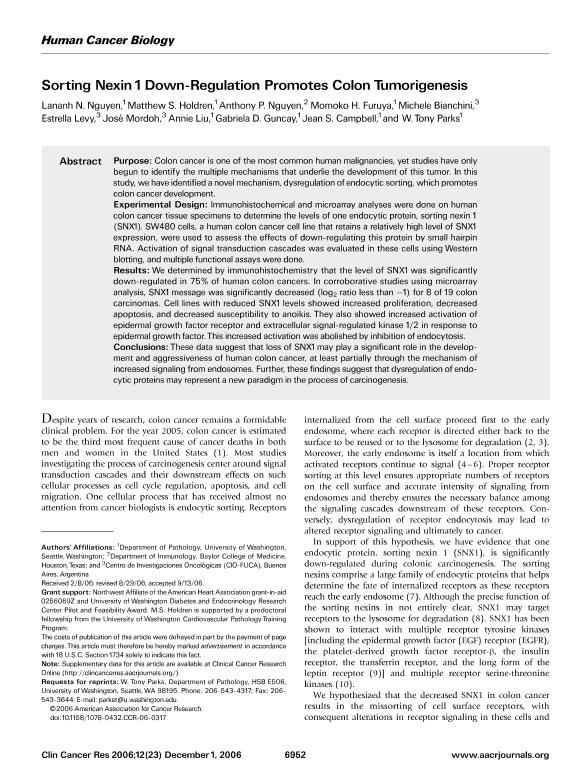Mostrar el registro sencillo del ítem
dc.contributor.author
Nguyen, Lananh N.
dc.contributor.author
Holdren, Matthew S.
dc.contributor.author
Nguyen, Anthony P.
dc.contributor.author
Furuya, Momoko H.
dc.contributor.author
Bianchini, Michele

dc.contributor.author
Levy, Estrella Mariel

dc.contributor.author
Mordoh, Jose

dc.contributor.author
Liu, Annie
dc.contributor.author
Guncay, Gabriela D.
dc.contributor.author
Campbell, Jean S.
dc.contributor.author
Parks, W. Tony
dc.date.available
2017-12-28T14:08:23Z
dc.date.issued
2006-12
dc.identifier.citation
Parks, W. Tony; Campbell, Jean S.; Guncay, Gabriela D.; Liu, Annie; Mordoh, Jose; Levy, Estrella Mariel; et al.; Sorting Nexin 1 Down-Regulation Promotes Colon Tumorigenesis; American Association for Cancer Research; Clinical Cancer Research; 12; 23; 12-2006; 6952-6959
dc.identifier.issn
1078-0432
dc.identifier.uri
http://hdl.handle.net/11336/31768
dc.description.abstract
PURPOSE: Colon cancer is one of the most common human malignancies, yet studies have only begun to identify the multiple mechanisms that underlie the development of this tumor. In this study, we have identified a novel mechanism, dysregulation of endocytic sorting, which promotes colon cancer development. EXPERIMENTAL DESIGN: Immunohistochemical and microarray analyses were done on human colon cancer tissue specimens to determine the levels of one endocytic protein, sorting nexin 1 (SNX1). SW480 cells, a human colon cancer cell line that retains a relatively high level of SNX1 expression, were used to assess the effects of down-regulating this protein by small hairpin RNA. Activation of signal transduction cascades was evaluated in these cells using Western blotting, and multiple functional assays were done. RESULTS: We determined by immunohistochemistry that the level of SNX1 was significantly down-regulated in 75% of human colon cancers. In corroborative studies using microarray analysis, SNX1 message was significantly decreased (log(2) ratio less than -1) for 8 of 19 colon carcinomas. Cell lines with reduced SNX1 levels showed increased proliferation, decreased apoptosis, and decreased susceptibility to anoikis. They also showed increased activation of epidermal growth factor receptor and extracellular signal-regulated kinase 1/2 in response to epidermal growth factor. This increased activation was abolished by inhibition of endocytosis. CONCLUSIONS: These data suggest that loss of SNX1 may play a significant role in the development and aggressiveness of human colon cancer, at least partially through the mechanism of increased signaling from endosomes. Further, these findings suggest that dysregulation of endocytic proteins may represent a new paradigm in the process of carcinogenesis.
dc.format
application/pdf
dc.language.iso
eng
dc.publisher
American Association for Cancer Research

dc.rights
info:eu-repo/semantics/openAccess
dc.rights.uri
https://creativecommons.org/licenses/by-nc-sa/2.5/ar/
dc.subject.classification
Medicina Critica y de Emergencia

dc.subject.classification
Medicina Clínica

dc.subject.classification
CIENCIAS MÉDICAS Y DE LA SALUD

dc.title
Sorting Nexin 1 Down-Regulation Promotes Colon Tumorigenesis
dc.type
info:eu-repo/semantics/article
dc.type
info:ar-repo/semantics/artículo
dc.type
info:eu-repo/semantics/publishedVersion
dc.date.updated
2017-12-12T20:03:39Z
dc.identifier.eissn
1078-0432
dc.journal.volume
12
dc.journal.number
23
dc.journal.pagination
6952-6959
dc.journal.pais
Estados Unidos

dc.journal.ciudad
Filadelfia
dc.description.fil
Fil: Nguyen, Lananh N.. University of Washington; Estados Unidos
dc.description.fil
Fil: Holdren, Matthew S.. University of Washington; Estados Unidos
dc.description.fil
Fil: Nguyen, Anthony P.. Baylor College of Medicine; Estados Unidos
dc.description.fil
Fil: Furuya, Momoko H.. University of Washington; Estados Unidos
dc.description.fil
Fil: Bianchini, Michele. Fundación Cáncer. Centro de Investigaciones Oncológicas; Argentina. Consejo Nacional de Investigaciones Científicas y Técnicas; Argentina
dc.description.fil
Fil: Levy, Estrella Mariel. Consejo Nacional de Investigaciones Científicas y Técnicas; Argentina. Fundación Cáncer. Centro de Investigaciones Oncológicas; Argentina
dc.description.fil
Fil: Mordoh, Jose. Fundación Cáncer. Centro de Investigaciones Oncológicas; Argentina. Consejo Nacional de Investigaciones Científicas y Técnicas. Oficina de Coordinación Administrativa Parque Centenario. Instituto de Investigaciones Bioquímicas de Buenos Aires. Fundación Instituto Leloir. Instituto de Investigaciones Bioquímicas de Buenos Aires; Argentina
dc.description.fil
Fil: Liu, Annie. University of Washington; Estados Unidos
dc.description.fil
Fil: Guncay, Gabriela D.. University of Washington; Estados Unidos
dc.description.fil
Fil: Campbell, Jean S.. University of Washington; Estados Unidos
dc.description.fil
Fil: Parks, W. Tony. University of Washington; Estados Unidos
dc.journal.title
Clinical Cancer Research

dc.relation.alternativeid
info:eu-repo/semantics/altIdentifier/doi/http://dx.doi.org/10.1158/1078-0432.CCR-06-0317
dc.relation.alternativeid
info:eu-repo/semantics/altIdentifier/url/http://clincancerres.aacrjournals.org/content/12/23/6952
Archivos asociados
